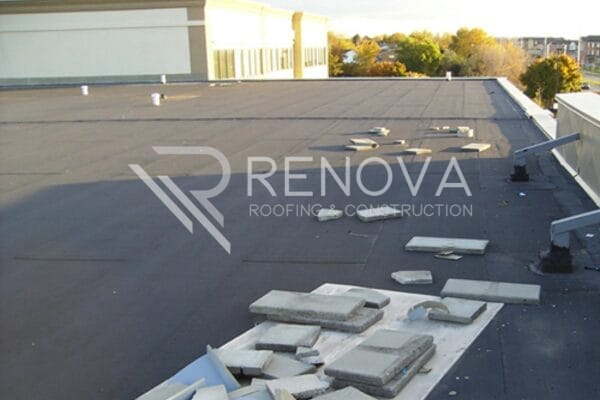We all know that for commercial buildings, a flat roof is the norm. However, more and more homeowners who are building their dream houses are also considering flat roofs. There is a wide range of materials available, and today, we will talk about the often discussed topic of modified bitumen roofs, or mod bit roofs for short.
If you’ve ever considered a replacement or new roof for your property, chances are you’ve come across this material. But what exactly is it? What are its benefits and disadvantages? Is it right for your project? While you may have seen many articles on TPO and EPDM, we also receive a lot of questions about mod bit roofs.
Today, I’m here to answer these questions and more, providing clarity on whether this type of flat roof is still a good option in 2024.
What Is a Modified Bitumen Roof?
Modified bitumen is a type of asphalt-based roofing material commonly used for flat or low-sloped roofs. In the past, it was mainly used for commercial buildings, but it has gained popularity for residential flat roofs as well.
Modified bitumen membranes emerged in the 1960s as an alternative to built-up roofs, bringing technological advances that promised better performance. Yet, like any material, they have their pros and cons. We will discuss both of these in the next section.
To read more about other flat roofing materials, read our guide on the top commercial roofing materials.

Pros of Modified Bitumen Roofs
The benefits of mod bit roofs are numerous, and for many property owners they far outweigh the potential downsides. Let’s delve into these advantages to give you an idea of why this might be the optimal solution to your roofing needs.
Increased Durability and Longevity
One substantial advantage that draws business owners and homeowners towards mod bit roofs is their durability. With proper maintenance, these types of roofs can last between 20 to 25 years. If the area you live in is not prone to harsh conditions, you can even expect it to last for 30 years, which makes it an investment worth considering.
Here are some of the reasons why:
Multi-Layer System; Greater Thickness
At the heart of modified bitumen’s longevity lies its simple yet strong design: It is a multi-ply membrane that is layered with asphalt and other reinforcing materials. This layering approach leads to a thick overall structure compared to single-ply roofing alternatives available on the market.
Because of this, it also delivers enhanced resistance to punctures along with longer-lasting performance under adverse conditions.
Very Durable in High Traffic Areas
If your roof has significant foot traffic, such as commercial buildings requiring regular rooftop maintenance, then the inherent durability of mod bit systems will prove beneficial. Their multi-layered configuration withstands high traffic remarkably well, helping prevent wear and tear from becoming a costly issue down the line.
Ease of Installation and Workability
As a flat roof owner in Georgia, you likely want to install a new roofing material as fast as possible so your business is not significantly impacted. This is another advantage of modified bitumen roofs. Mod bit roofs aren’t just about strength, they also offer impressive ease of installation.
Roofing contractors find it easier to work with modified bitumen due to its manageable weight and pliability. The adaptability and ease of working with modified bitumen roofing membranes contribute to faster installation times.
During the installation, roofing contractors can easily navigate around obstacles on your roof for a more efficient project completion, making it an attractive option for both home and commercial roofing projects.
Adaptability and Flexibility
One of the standout features of modified bitumen is its adaptability. It can easily conform to complex structures and designs. During installation, when exposed to heat, the modified bitumen becomes pliable and flexible, allowing it to adapt seamlessly to irregular shapes, corners, and contours on the roof surface.
This flexibility enables it to fit snugly around protrusions such as chimneys, vent pipes, and HVAC systems without compromising its integrity or protective properties.
Improved Resistance Against Fire and Wind Damage
Last but not least is mod bit roofs’ excellent fire-resistance and improved defense against potential wind damage. With fire-resistant properties thanks to their asphalt content, they can stop the spread of flames.
Furthermore, their sturdy composition also offers superior performance against gusty winds that could otherwise result in uplift or roof deck damage.
While there are plenty of benefits of modified bitumen roofs—from increased durability due to its multiple layers and thickness to remarkable weather-resilience—each structure’s needs are different. So, it’s always wise to consider individual circumstances before jumping onto the mod bit bandwagon!
Cons of Modified Bitumen Roof
As a trusted roofer in the Gulf Coast, we want to make sure that we offer you the full picture of a material so that you can make the best choice. Before making a decision about installing a modified bitumen roof, it’s important to be aware of some potential drawbacks that come along with this choice. Not every roofing system is perfect, and the same goes for the modified bitumen.
Heat Absorption in Summer Months
One notable drawback of modified bitumen roofs is their tendency to absorb a significant amount of heat during the summer months. The dark surface of most modified bitumen roofs naturally attracts more sunlight than light-colored or reflective surfaces. Consequently, these roofs can get quite hot under the intense summer sun.
Why Modified Bitumen Roofs Absorb Heat and How it Affects Energy Efficiency
Due to their generally dark color (usually black) and composition, modified bitumen rooftops can easily attract and retain heat. This issue can lead to higher interior temperatures, potentially resulting in increased air conditioning costs in an effort to keep interiors cool.
Despite the use of cooling technologies like HVAC systems, maintaining desired temperature levels may require extra energy consumption, therefore making it a less energy efficient choice.
Higher Risk Application Methods Compared to Single-Ply Systems
Modified bitumen typically requires an application process that involves heating the material until it melds together – a method experts refer to as a “torch-down” application. However no matter how experienced a contractor is at applying this type of roofing membrane, there’s undoubtedly a substantial risk involved when using open flames on a rooftop.
Vulnerability to Ponding and Water Damage
Despite their many advantages, modified bitumen roofs are susceptible to damage due to water ponding, especially in areas prone to heavy rainfall. If pooling water sits on a flat roof for too long, it tends to seep into the cracks or seams over time, leading to leaks and structural degradation. Therefore, adequate drainage is vital in order to maintain the integrity of these roofing systems.
Potential Higher Cost Compared to Other Roofing Options
While prices will fluctuate based on various factors such as the location and size of the project, the upfront cost of installing a new modified bitumen roof can sometimes exceed that of other flat roof membranes like TPO or EPDM.
Generally, although they offer impressive durability and longevity attributes which could translate into long-term savings, the initial investment is generally higher.
How Much Do Modified Bitumen Roofs Cost?
Now that you know about the advantages and limitations of this popular roofing material, it’s time to talk about another crucial factor that can influence your decision: cost. According to current estimates, the cost of mod bit roofs can be anywhere from $4 to $9 per square foot.
There are two main types of mod bit membranes, which come at different price points. SBS modified bitumen is generally less expensive, costing around $3 to $6 per square foot, while the APP modified bitumen costs between $5 and $7 per square foot.
Also Read: How Much Does Roof Restoration Cost in 2024

Should I Install A Modified Bitumen Roof?
We hope that you now have a full understanding of the pros and cons of modified bitumen. As you can see, it’s a durable and long-lasting roofing material, but you will need to take care of it with proper maintenance to take advantage of these benefits.
If you want to install a modified bitumen roof in the Gulf Coast, contact our team at Renova Roofing & Construction. We are premier roofing contractors serving Alabama, Louisiana, and Mississippi. Other than mod bit roofs, we also install other flat roofing materials such as TPO and EPDM. Contact us today at (601) 647-3433 to learn more.

